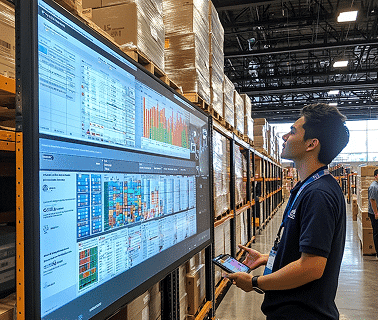Listen to this blog
The retail sector is dynamic and rapidly changing. The days of only making purchases in person on the high street are long gone. E-commerce has entered the modern era and will contribute enormously to the global economy. These days, it’s not enough for stores to stock their shelves with inventory; to meet customer demand, retailers must also source, locate, pack, and ship hundreds or even thousands of items daily. So, here’s a quick look at why retail and logistics management is so crucial to the retail sector and how it’s enabling innovative forms of shipment.
What is retail logistics?
Retail logistics refers to the process of planning, implementing, and controlling the flow of goods and materials from suppliers to retail stores, and ultimately to the end consumer. It involves managing the movement and storage of products efficiently and cost-effectively to meet customer demands while maximizing profitability for the retailer.
Goods are received in a warehouse, inventoried, orders processed, and then shipped as part of the retail logistics process. Customers now anticipate both quickness and low prices when placing an order. Thus each of these steps must be optimized to suit these needs.
Role of logistics in retail management
Logistics plays a crucial role in retail management by ensuring that products are efficiently and effectively delivered to customers while minimizing costs and maximizing profitability. Here are some key aspects of how logistics contributes to retail management.
- Logistics ensures that the supply chain operates smoothly from the procurement of goods from suppliers to the delivery of products to retail stores or directly to customers. Efficient supply chain management helps retailers reduce lead times, lower inventory carrying costs, and respond quickly to changes in demand.
- Logistics is essential for managing inventory levels across the retail network. By optimizing inventory levels and distribution, retailers can minimize stockouts, reduce excess inventory, and improve inventory turnover rates, leading to increased sales and profitability.
- Timely and accurate delivery of products is critical for customer satisfaction. Logistics ensures that products are available when and where customers want them, whether it’s in-store or through e-commerce channels. Meeting customer expectations for delivery speed, reliability, and convenience enhances brand loyalty and drives repeat business.
- Effective logistics management helps retailers control transportation, warehousing, and other operational costs. By optimizing transportation routes, consolidating shipments, and improving warehouse efficiency, retailers can reduce transportation expenses and overall supply chain costs, contributing to improved margins and profitability.
Read more: How supply chain helps in FMCG industry
Importance of logistics in retail industry
Effective logistics management is essential for retail success, enabling retailers to deliver value to customers, drive sales, and maintain a competitive edge in the marketplace.
- Supply chain management
An analogous word that broadens the scope to incorporate supplementary, laterally-applied business methods that reduce waste, speed up product turnover, and boost profitability. Although not the same thing, supply chain management in the retail industry and the basic tenets of business logistics typically go hand in hand.
Read more: Role of supply chain management in the retail industry
- Material sourcing
Supply chain management begins with the acquisition and distribution of raw materials or smaller, individual components that will ultimately be constructed into a finished product, setting off product flows in the remainder of the business’s logistics cycle.
- Transportation
Logistics planning, execution, and management, including incoming and outbound transport, shipping mode selection, transit time, and coordination with third-party logistics providers.
- Product delivery
In today’s competitive industry, customers increasingly expect faster turnaround times. Distribution networks and the timely and secure conveyance of commodities to satisfy customer demand rely heavily on logistics.
- Inventory management
Controlling the flow of commodities and items physically stored in various warehouses on a daily basis. In order to accomplish executive-level inventory operations, such as order fulfillment, material handling, and demand forecasting, inventory managers use inventory management systems and order processing software.
- Cost reduction
Excellent logistics will establish trustworthy methods that boost the quality of service provided to customers. Having good ties with suppliers can help expedite deliveries and cut expenses.
- Data analytics & technology
Logistics management increasingly relies on data analytics and technology solutions to optimize operations. Advanced analytics tools help retailers forecast demand more accurately, optimize inventory levels, and identify opportunities for cost savings and process improvements. Technologies such as RFID, GPS tracking, and warehouse management systems (WMS) enable real-time visibility and control over the movement of goods, improving efficiency and responsiveness.
The role of logistics in the supply chain
- When it comes to the safekeeping of goods of all kinds, the importance of logistics in the retail industry cannot be overstated. A logistics firm that moves and stores raw materials or completed items must have sufficient storage facilities for both.
- The logistics firm’s other job is to ensure the right items are picked up and sent to the right places. The need for more than one terminal to pick up and drop off passengers is possible.
- Correctly handling goods transit is where a logistics business’s competence shines. A company’s bottom line can benefit from a more thorough analysis of the least expensive modes of transport for each product category.
Read more: Supply chain management in e-commerce
Explore a career in logistics & supply chain management
As the need for supply chain management services continues to grow, the demand for Logistics Managers is expected to rise. Each year, there are more and more additions to the number of businesses that manufacture things. So, the demand for Logistics Management will continue to rise. It’s a safe bet to say that this field will be in demand in the years to come.
If you wish to pursue a career in logistics, then Manipal Academy of Higher Education’s (MAHE) PGCP in Logistics & Supply Chain Management is the right choice for you. You can access this professional certification course on the Online Manipal website. If you wish to start your own business in this domain or move to leadership positions from your current role, then you can consider pursuing an online MBA in Supply Chain Management from Manipal University Jaipur.
Conclusion
With technology’s pervasiveness and expanding supremacy, retail logistics is a competitive field full of opportunities. One must always remain one step ahead of the competition in order to survive in this fast-paced and frequently volatile industry. The only rational course of action for retail companies is to give careful thought to delivery and logistics in advance of any seismic changes in the industry.
Prepare for your next career milestone with us








